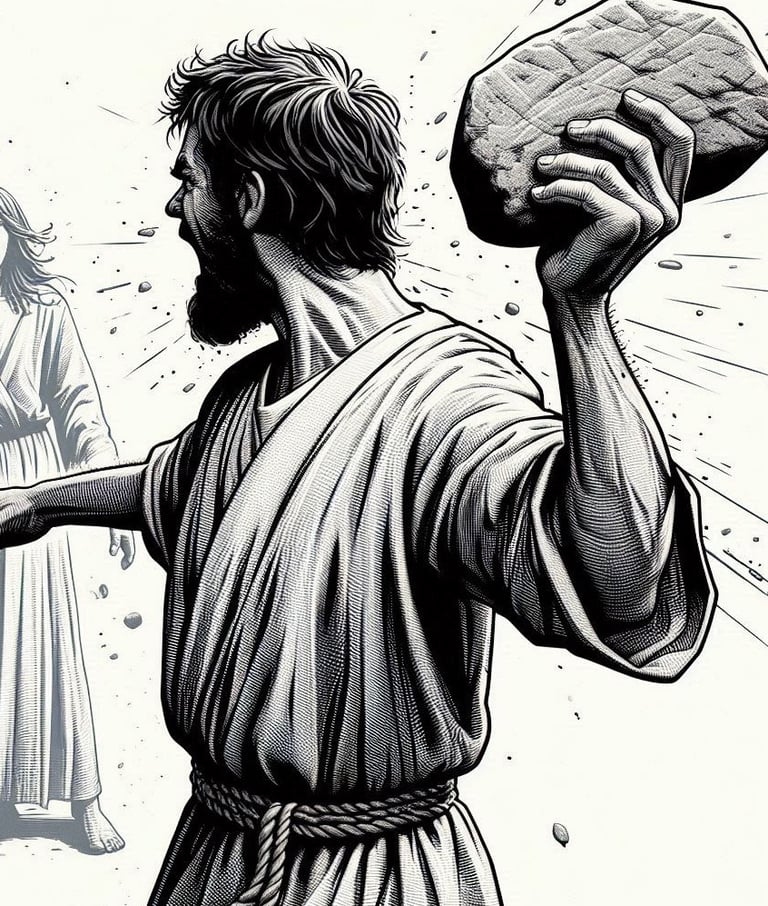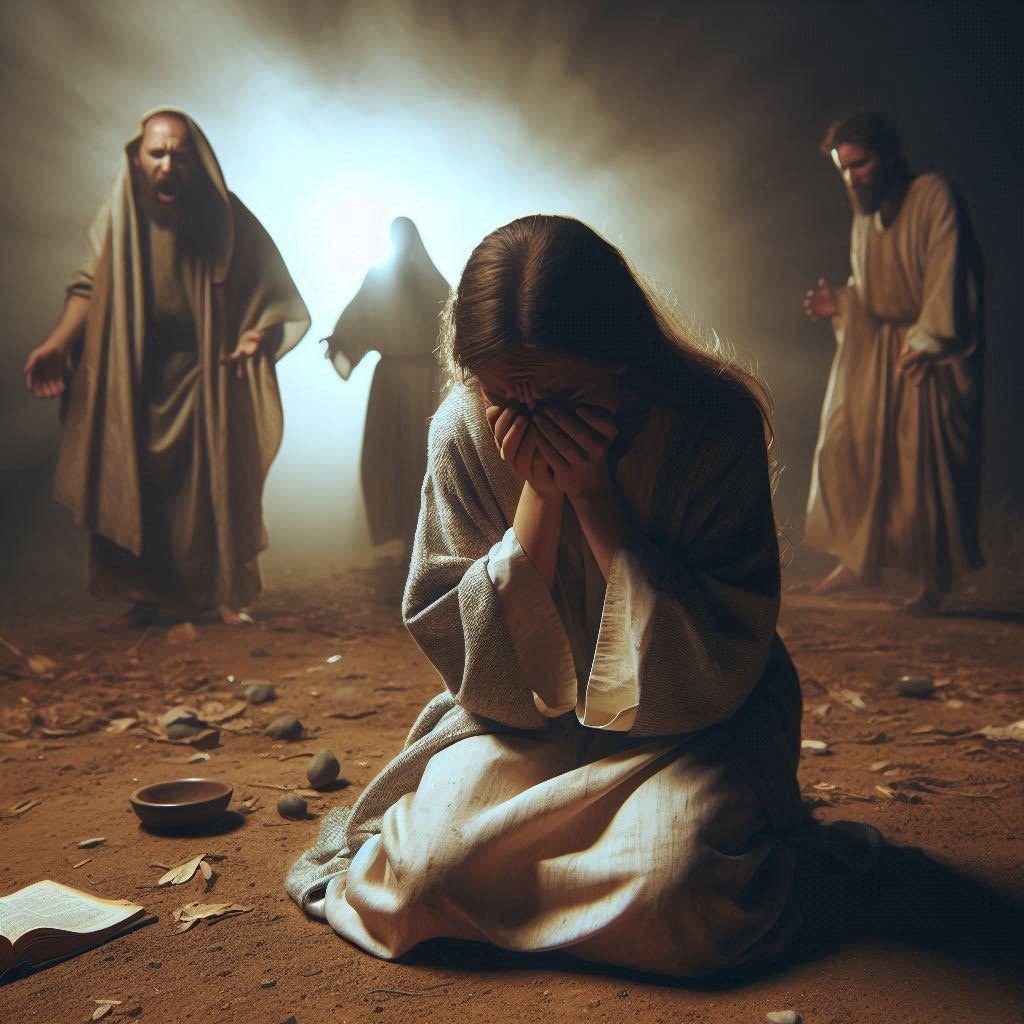The Whisper of Grace in the Warm Embrace of the Master
The Master, with graceful resolve, bends down and, as if the ground were a blank canvas, begins to trace mysterious and indecipherable letters. Insistent voices clamor around him: "What do you say to all this?" But suddenly, the commotion vanishes. The diabolical voices, thirsty for revenge, are extinguished like candles before a sudden gust of wind.
ARTICLES
A. Nice
7/2/20248 min read


The Red-Light District
You are a time traveler, an accidental tourist on the streets of an ancient city. The afternoon sun paints the dust swirling around your feet with gold. Suddenly, chaos erupts: shouts, a flurry of tunics and sandals. A man, pale and wild-eyed, bursts from a rickety wooden door, covering his nakedness, fleeing in terror. But no, he's not running from an enraged creditor of the era or a jealous husband who caught him with his beloved wife. The reasons are different. Let me explain:
This is not a modern gossip piece. Your life, accustomed to the digital age of your time, conjures up sensational headlines: "Scandal in the red-light district! Local dignitary caught red-handed!" You even envision a viral scroll plastered on a post, with millions of hand-drawn little hearts and "likes." But no. You are in the heart of ancient Judea, where sins are washed with blood and stones speak louder than words. This man doesn't fear the stones; he flees from shame, or perhaps because the bribe wasn't worth it.
But what follows is an even more disturbing spectacle. From that seedy tavern, a figure emerges: a woman dragged through the streets, her tattered tunic revealing her humiliating nakedness. Each pull, each cry from the mob, is a brutal reminder of the power of the law and the cruelty of those who enforce it.
You see the terror in her eyes, the burning shame on her exposed skin. It is a public punishment, a sacrifice at the altar of morality, a terrible price for defying the guardians of the church of that time.
The Executioners and the Judge
And so, this group of religious leaders, scribes and Pharisees—as they are known—self-proclaimed guardians of holiness, leads the march while their followers, a fervent mob, wave their arms shouting: "Justice, justice!" They advance a few meters until they encounter a mysterious figure who at that moment was imparting his teachings to certain followers.
"What a shame I don't have a phone to capture this moment!" you think. Not even that toy camera you gave your little sister to immortalize the scene. The figure who stands before the crowd and the battered woman has the aura of a judge, but also something more, something indescribable. His figure is magnetic, emblematic, and his eyes... those eyes radiate a love so profound that words cannot describe it! Moreover, John, who was a boy about your age at that time, recounts it like this:
"The teachers of the law and the Pharisees brought in a woman caught in adultery. They made her stand before the group and said to Jesus, “Teacher, this woman was caught in the act of adultery. In the Law Moses commanded us to stone such women…” John 8:3-5 NIV
At that moment, a follower of Jesus stealthily approaches and whispers in your ear: "It's a trap, everything is staged. They want to destroy Jesus." A shiver runs down your spine: everyone, except the disciples, begins to pick up the largest and sharpest stones at their feet. Well, the leaders already had good-sized ones in their hands, and you know that if the stones start flying, you could be next. The idea of fleeing seizes you, but where to go? Maybe they will accuse you of being the woman's accomplice. A thousand terrifying scenarios crowd your mind.
But then, the story takes an unexpected turn. The emblematic figure, faced with the cruel and insistent voices demanding an answer, remains silent for a moment. The air thickens, the tension is palpable. Finally, with a demonic voice that resonates in the silence, the wicked ones ask: "What then do you say?" (Verse 5). And John's account says: "This they said to test him, that they might have some charge to bring against him" (John 8:6).
Accusers Self-Accused
The Master, with graceful resolve, bends down and, as if the ground were a blank canvas, begins to trace mysterious and indecipherable letters. Insistent voices clamor around him: "What do you say to all this?" But suddenly, the commotion vanishes. The diabolical voices, thirsty for revenge, are extinguished like candles before a sudden gust of wind.
The Holy One stands tall, not only looking into the eyes of his accusers but piercing the darkness of their hearts. With a voice that booms in the silence, he declares: "Let him who is without sin among you be the first to throw a stone at her." And, like a wise Judge, he bends down again. Then, you hear the thud of stones falling to the ground as the accusers, from the oldest to the youngest, slip away in silence, ashamed and defeated. Ah! What a relief! Your muscles relax, and the stress melts away. John recounts it like this:
"And once again he bent down and wrote on the ground. When they heard it, they went away, one by one, beginning with the elders; and Jesus was left alone with the woman standing before him" (John 8:8-9).
What an overwhelming scene follows! Only Jesus and the woman remain, humiliated, her clothes torn, and her face streaked with tears of shame and pain. What is about to happen leaves everyone speechless: Jesus, defying the laws of ritual purity that prohibited touching sinners, lepers, the unclean, etc., like a merciful shepherd approaches the woman and, with a gesture of infinite compassion and tenderness, takes her by the hand, lifts her up, as if to say: Lift up your head! John declares: "Jesus straightened up and asked her, “Woman, where are they? Has no one condemned you?” John 8:10.
This is unbelievable! Such a powerful and unexpected turn of events. It is unheard of what is happening: The woman, bursting into liberating tears, pours herself out at Jesus' feet and with trembling lips and voice, answers him: "No one, sir" (John 8:11). That warm embrace, and that tender compassion, prepare her soul, which like a thirsty desert receives the most beautiful and solemn words ever heard: "Then neither do I condemn you," Jesus declared. "Go now and leave your life of sin." John 8:11.
This Jesus of the Gospels opens your eyes to a truth you would never have perceived. Those who were dragging the woman, wrapped in their long robes and demanding respect with the title of "Rabbi," eager to always occupy the first places at banquets, were not who they seemed (Matthew 23:5-7; Luke 11:43; Mark 12:38-39). They saw themselves and presented themselves as "holy." But Jesus revealed their true nature: He exposed the wickedness of their accusing tongues; their sin was a hundred times greater than the carnal sin of this offender.
This spectacle before your eyes is disconcerting and contradicts the commandment of the Pentateuch that states: "If a man commits adultery with another man's wife—with the wife of his neighbor—both the adulterer and the adulteress are to be put to death" (Leviticus 20:10). And Deuteronomy adds: "If a man is found sleeping with another man’s wife, both the man who slept with her and the woman must die. You must purge the evil from Israel" (Deuteronomy 22:22).
But in this scandal, the man involved is not judged, for it was enough to arrest the woman to put Jesus in a predicament. On the other hand, why bring this case to Jesus when the Sanhedrin existed? It was a trap to test him and find a way to destroy him. Jesus faces a dilemma: if he condemns the woman, he contradicts himself, for he associated with sinners; if he forgives her, he is against the law of Moses and encouraging sin.
The Blurred Jesus of Today
But this Jesus seen here is extraordinary, a model that contrasts with the Christianity of the present time. This Jesus, capable of reading hearts, did not lower the demands of the law nor excuse the woman's sin. He did not even question the penalty of stoning, but challenged her accusers with a simple phrase: "Let any one of you who is without sin be the first to throw a stone at her" (John 8:7).
This Jesus of whom John speaks was the only one who could condemn her and cast the first stone because he was the only one without sin. And although no one is as severe as He against sin, no one is as merciful as He toward the sinner. He is "slow to anger and abounding in steadfast love and faithfulness" (Exodus 34:6).
This Jesus, in his role as the Great Judge, gives confidence and teaches that those sinners brought before the Lord's court have no reason to worry: the sinner is alone with Him, and only He will pronounce sentence in the case. "The holiest is the most merciful. Christ was so purely holy that He could afford to be abundantly merciful. He is the enemy of sin, but the Friend of sinners" (B. Thomas).
This Jesus invites reflection on the church today: often there are people who measure their spirituality by comparing themselves with others and act self-righteously. They see their neighbor fallen and congratulate themselves, thinking to themselves: "Good thing that happened to him! Good thing I'm not such a sinner!" They forget that the most depraved and wicked are usually the harshest and most censorious.
This Jesus does not go unnoticed by those who, despite reading the Bible, remain blind to the words of Paul: "Therefore you have no excuse, O man, every one of you who judges. For in passing judgment on another you condemn yourself, because you, the judge, practice the same things" (Romans 2:1)
The Jesus Who Invites Us to His Embrace
The Jesus of this story also teaches us that when we find fault in others, especially in our brothers and sisters in the faith, we should reflect and be more severe with our own sins. If we have a duty to admonish, we must first examine ourselves and remember the words of the apostle: "Brothers, if anyone is caught in any transgression, you who are spiritual should restore him in a spirit of gentleness. Keep watch on yourself, lest you too be tempted" (Galatians 6:1).
This Jesus we see in the Bible embodies the climax of holiness; love, mercy, and second and third and seventy times seven chances. He is the only one with "authority on earth to forgive sins" (Matthew 9:6). And the only one who did not come to condemn the world but "that the world might be saved through him" (John 3:17).
If the tide of another's hatred drags you down, if lies nest in the perverse hearts of modern-day Pharisees, let yourself be carried to the bosom of infinite love; if the boiling wave of human vengeance looms over you, throw yourself into the warm embrace of the Master's forgiveness, who only pronounces with his lips of love: I do not judge you, I forgive you, go on. Sin no more (John 8:11).
"Come to me, and I will grant you peace." - Jesus








Enjoy this? You might also like to read: When Chaos Invade your Life and your inner....